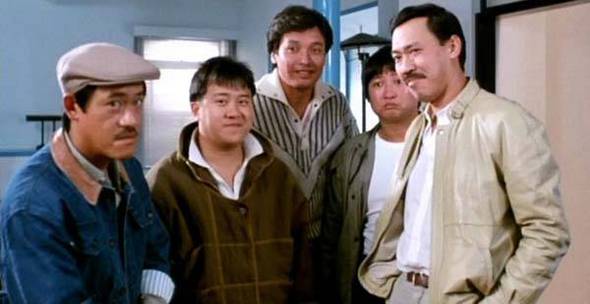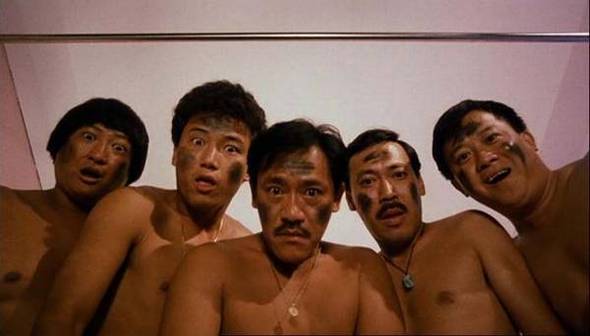 |
Statistics :
11630 Movies
19215 People
1448 Studios
29 Articles
73 Interviews
12 DVD Reviews
32452 Screenshots
3722 Videos
|
|
 |
|
|

|
 HKCM : Could you talk about how you became involved with the Aces go Places series beginning in 1982 at Cinema City ? (he directed the 1 st 2 instalments). HKCM : Could you talk about how you became involved with the Aces go Places series beginning in 1982 at Cinema City ? (he directed the 1 st 2 instalments).
|
| ET : Jackie Chan and Sammo Hung wanted me to go to Golden Harvest.
Around that time, Jackie Chan was doing The Young Master (1980).
About the same time, I met up with Karl Maka again, and he asked me to go to Cinema City. He asked how much I wanted, so I went through the list of my expenses—my car, my wife, my son—and added it up—about HK$20, 000. I gave him a figure and he said okay—it took one minute. So, I told Jackie Chan that I had made a deal with Cinema City . I had been talking to him for over a month about a deal, and I had an arrangement in one minute with Cinema City .
My first job for them was to direct a film for Chinese New Year. We saw a film that was similar to Aces Go Places about two bad guys who had stolen something, one guy was in jail, and the other was being chased—we thought it would be great to add a comedic element with Sam Hui.
This was a very good story, and we thought we were successful, but we wanted more. The big summer movie that year featured James Bond. It had Bond girls, car chases, and modern weapons; it was very stylish. We wanted to make a film like this, but add more comedy. I thought about Young Master —no new weapons, no girls, no new fashions—just old style fashions. I thought I could beat that, but I really felt keen competition. It felt like we were all in training to box with the world champion, because, if we could beat the world champion Jackie Chan, we would really be something. I felt just like a boxer. All the guys-- Tsui Hark, Karl Maka etc.—were all in training like boxers. We were just like a family doing Aces Go Places. We had a formula—comedy plus girls and special effects. |

My Lucky Stars with Richard Ng, Eric Tsang, Charlie Chin, Samo Hung & Stanley Fung
|
| |
 HKCM : At this time In the Cinema City company you were a member of the "Gang of 7", a board that was supposed to greenlight projects, to finance and to direct them. Do you have any specific memories from this period? - Karl Maka had a "struggle room" in his apartment where you were used to work overnight… Tell us more about it? -Tsui hark's wife, Nanshun Shi told us that your most valuable contribution to the "Gang of 7" was to bring your street knowledge, you are "street wise" she said. What was the contribution of the other members of the board? HKCM : At this time In the Cinema City company you were a member of the "Gang of 7", a board that was supposed to greenlight projects, to finance and to direct them. Do you have any specific memories from this period? - Karl Maka had a "struggle room" in his apartment where you were used to work overnight… Tell us more about it? -Tsui hark's wife, Nanshun Shi told us that your most valuable contribution to the "Gang of 7" was to bring your street knowledge, you are "street wise" she said. What was the contribution of the other members of the board? |
| ET : We each had our own strong points and weak points. Karl Maka always listened. Tsui Hark and I were always talking. Tsui Hark is a very fast talker—sometimes people can't follow what he's saying. I would catch what Tsui Hark had to say, and, then, I would explain it to everybody. Every day we would meet from 11 pm until 8 am , because, during that time, we would not have to take phone calls. We would sit in a very small room—we'd have to squeeze if anyone else came in the room. Every night, we would talk about Hong Kong film, new story ideas, etc. We would watch old movies on television to get new ideas. We would do everything in this one small room. Raymond Wong Pak-Ming was the writer, and he would listen to everything and write it up for the following day. However, he had a problem. When he was working on the transcription, his house would clear out because there were always too many foul words on the tape.
When we were working, we were always trying to forecast what would happen half a year or a year later. Even though we were 7 guys, we always felt small, because Golden Harvest and Shaw Brother s were the big studio players. After Aces Go Places , the two giants really had to join together to follow us. For example, Sammo Hung made the My Lucky Stars series (beginning in 1985). Others would make similar movies, so we always had to create new lines, so people couldn't follow us so fast. We would still do the old series, but we began to make new series as well at Cinema City. Cinema City was a very creative company. For example, we did Tsui Hark's All the Right Clues for the Right Solution with George Lam and Teddy Kwan. N
We made all different styles of movies, and we promoted new directors. We knew that Shaw Brothers and Golden Harvest
really were headed by distributors not movie makers. They knew how to sign up actors to make money—for every Bruce Lee , they would sign up 10 actors who may never become stars—this would take up a lot of the studio's resources. What we did was to get our entire production team in front of the camera, so Karl Maka, Tsui Hark, and I all acted in Cinema City films. Before that, actors were handsome, but we were short, fat, bald, and, after that, anyone could become an actor. Cinema City emphasized comedy and entertainment. We also always tried to be the first in new genres—comedy, kung fu comedy, horror comedy, all the different types. |
| |
 HKCM : In 1984 you leave the Cinema City . But you were share holder of this company. What made you leave the company? HKCM : In 1984 you leave the Cinema City . But you were share holder of this company. What made you leave the company? |
ET : I remember I talked to Karl Maka. When I first started, we were all like seven babies eating from the same pot of rice, but we had all gotten full from that pot, and we needed to move on. We were grown up, and I needed to try new things. I did keep a share in the company, though. I wanted them to promise to have me back, if I left the company and did not do well. I wanted to go out and see what would happen. We were all like brothers, so they understood.
Around that time, Sammo Hung approached me. He said he had many enemies at Golden Harvest, and he wanted me to be his strategist—I was the associate producer for
Twinkle Twinkle Litte Stars (1985).
At that time, I was happy to produce and direct, but Sammo Hung and Dickson Poon had started Duk-Bo
(D&B Films Co).
I got a call from the boss at Golden Harvest, saying there was an emergency. He was having trouble making the release date for the next My Lucky Stars, so I stepped in to direct. I told him that if he gave me seven air tickets that I could have a new screenplay for him in three days. I had a lot of confidence.
Wang Bu-yi (Barry Wong)
wrote lots of Hong Kong scripts. When he died about ten years ago, I feel that Hong Kong films really lost someone important. He wrote lots of Hong Kong films—very clever guy. I took him and the production team to Japan , and I got the film finished on time. That's how I joined the "Lucky Stars". |

Twinkle Twinkle Lucky Stars with Samo Hung, Miu Kiu Wai, Richard Ng, Stanley Fung and EricTsang
|
| |
|
|
| |
 |
|
|
Page :
1
2
3
4
5
6
7
Top
|
|
|
|
|
|
|
 |
